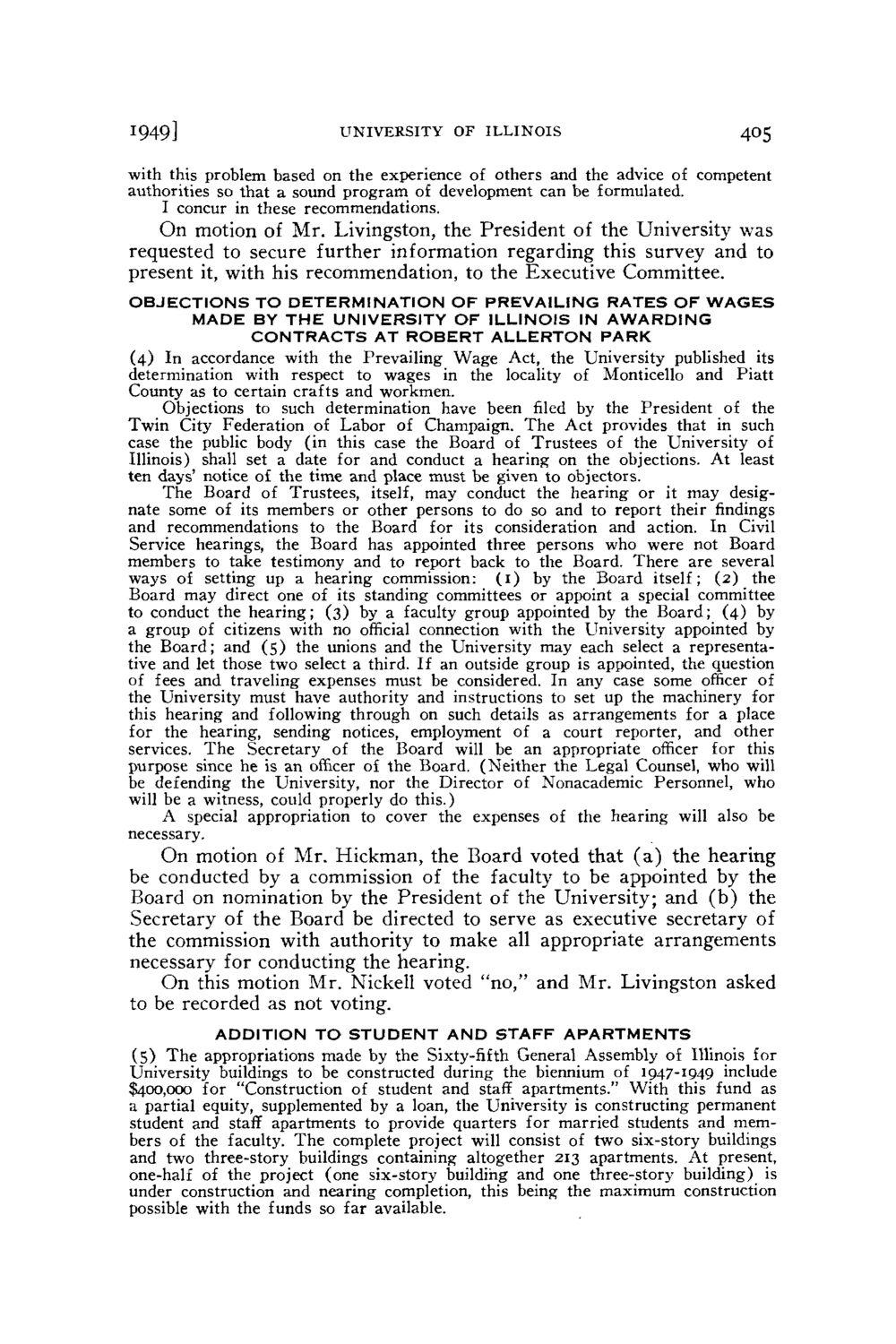| |
| |
Caption: Board of Trustees Minutes - 1950
This is a reduced-resolution page image for fast online browsing.

EXTRACTED TEXT FROM PAGE:
1949] UNIVERSITY OF ILLINOIS 405 with this problem based on the experience of others and the advice of competent authorities so that a sound program of development can be formulated. I concur in these recommendations. On motion of Mr. Livingston, the President of the University was requested to secure further information regarding this survey and to present it, with his recommendation, to the Executive Committee. OBJECTIONS TO DETERMINATION OF PREVAILING RATES OF WAGES MADE BY T H E UNIVERSITY OF ILLINOIS IN AWARDING CONTRACTS AT ROBERT ALLERTON PARK (4) In accordance with the Prevailing Wage Act, the University published its determination with respect to wages in the locality of Monticello and Piatt County as to certain crafts and workmen. Objections to such determination have been filed by the President of the Twin City Federation of Labor of Champaign. The Act provides that in such case the public body (in this case the Board of Trustees of the University of Illinois) shall set a date for and conduct a hearing on the objections. At least ten days' notice of the time and place must be given to objectors. The Board of Trustees, itself, may conduct the hearing or it may designate some of its members or other persons to do so and to report their findings and recommendations to the Board for its consideration and action. In Civil Service hearings, the Board has appointed three persons who were not Board members to take testimony and to report back to the Board. There are several ways of setting up a hearing commission: (1) by the Board itself; (2) the Board may direct one of its standing committees or appoint a special committee to conduct the hearing; (3) by a faculty group appointed by the Board; (4) by a group of citizens with no official connection with the University appointed by the Board; and (5) the unions and the University may each select a representative and let those two select a third. If an outside group is appointed, the question of fees and traveling expenses must be considered. In any case some officer of the University must have authority and instructions to set up the machinery for this hearing and following through on such details as arrangements for a place for the hearing, sending notices, employment of a court reporter, and other services. The Secretary of the Board will be an appropriate officer for this purpose since he is an officer of the Board. (Neither the Legal Counsel, who will be defending the University, nor the Director of Nonacademic Personnel, who will be a witness, could properly do this.) A special appropriation to cover the expenses of the hearing will also be necessary. On motion of Mr. Hickman, the Board voted that (a) the hearing be conducted by a commission of the faculty to be appointed by the Board on nomination by the President of the University; and (b) the Secretary of the Board be directed to serve as executive secretary of the commission with authority to make all appropriate arrangements necessary for conducting the hearing. On this motion Mr. Nickell voted "no," and Mr. Livingston asked to be recorded as not voting. ADDITION TO STUDENT AND STAFF APARTMENTS (5) T h e appropriations made by the Sixty-fifth General Assembly of Illinois for University buildings to be constructed during the biennium of 1947-1949 include $400,000 for "Construction of student and staff apartments." With this fund as a partial equity, supplemented by a loan, the University is constructing permanent student and staff apartments to provide quarters for married students and members of the faculty. The complete project will consist of two six-story buildings and two three-story buildings containing altogether 213 apartments. At present, one-half of the project (one six-story building and one three-story building) is under construction and nearing completion, this being the maximum construction possible with the funds so far available.
| |